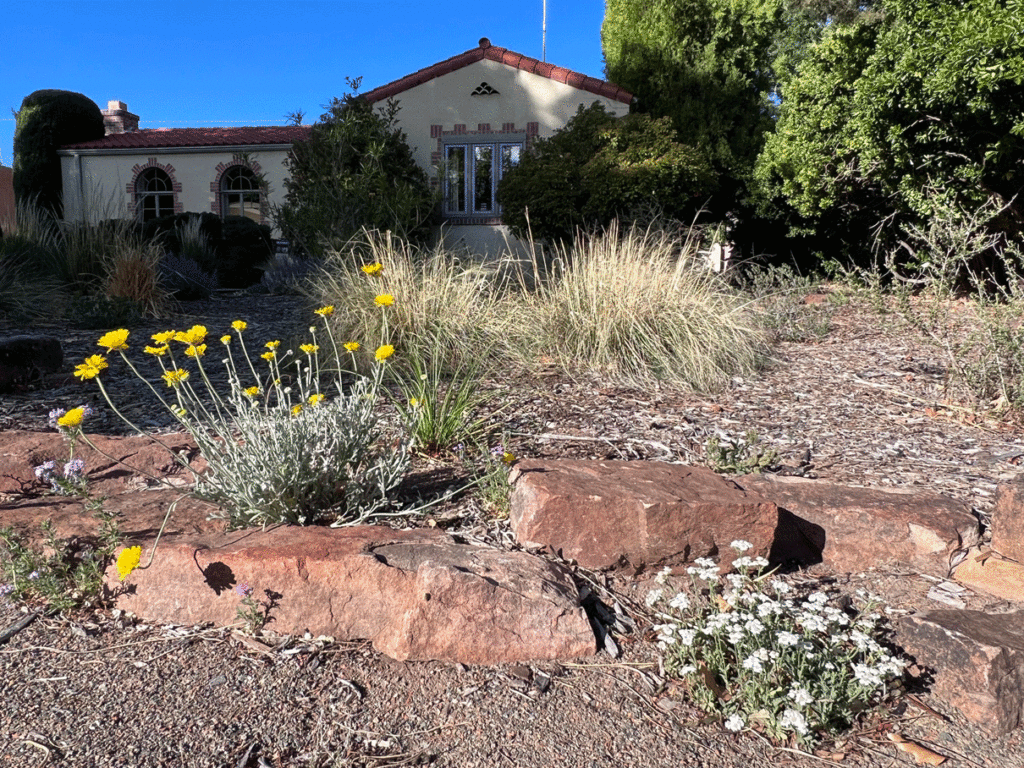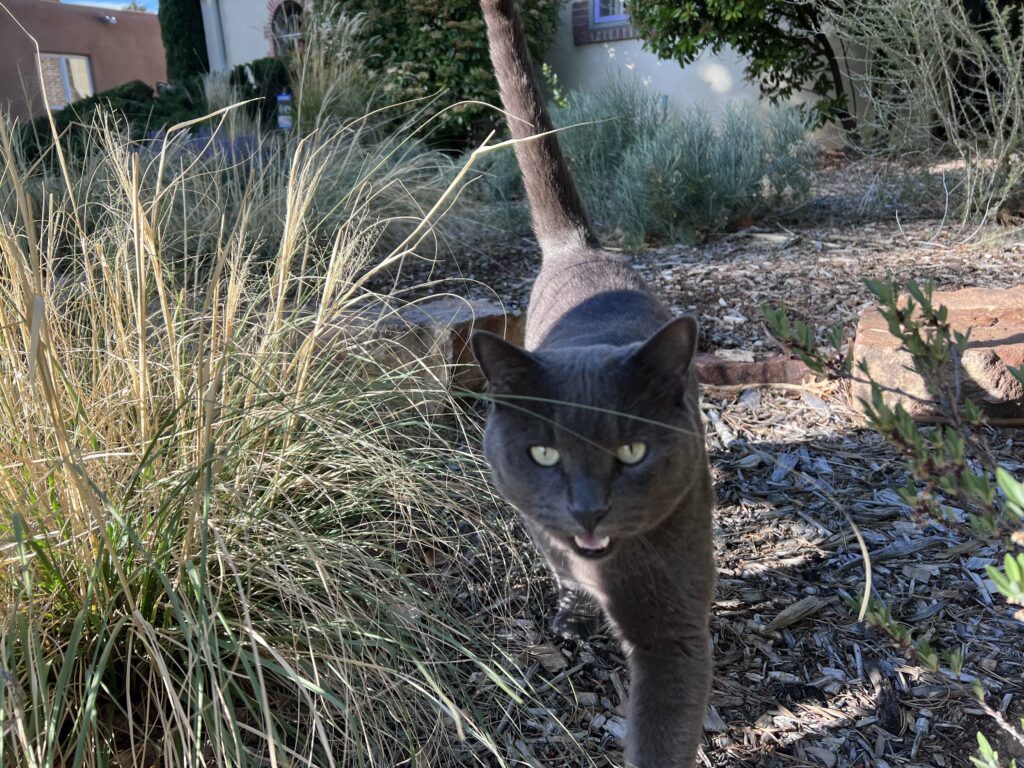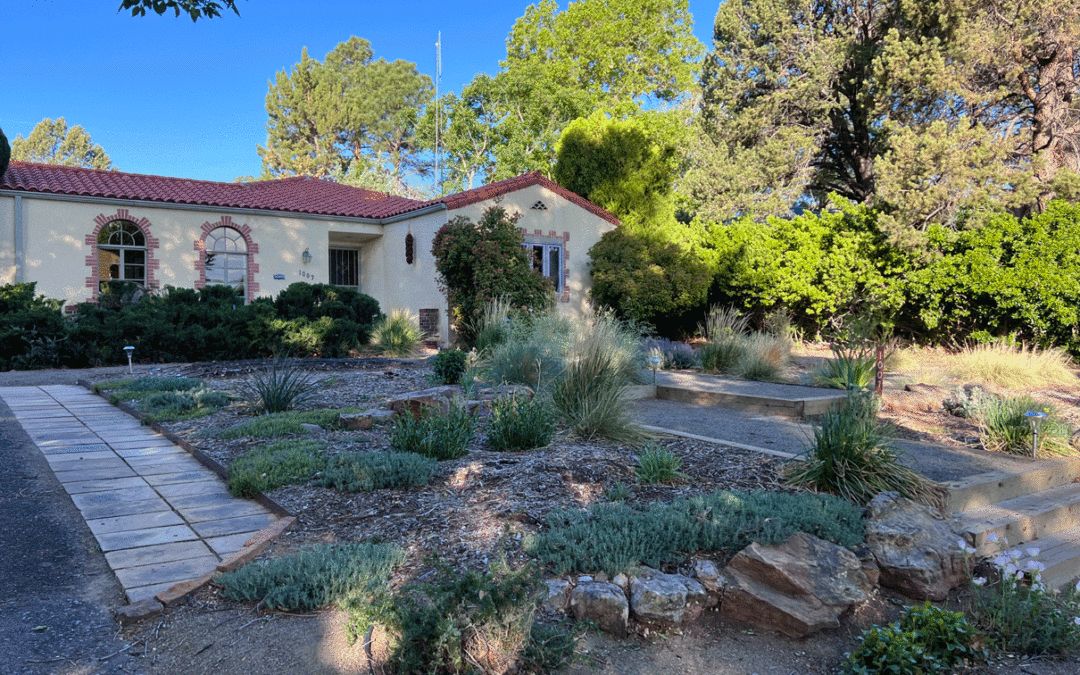Desert friendly xeriscapes are a great way to replace high-water-use turf grass with something beautiful, low-water-use and wildlife-friendly. Many Albuquerque area homeowners are taking their conversion projects a step further and choosing wood chip mulch over gravel or other aggregate, which can get hot and allow weeds to pop up.
Our featured homeowner replaced 2,000 square feet of high-water-use grass lawn with a xeriscape filled with a variety of local native plants. Their lawn had become too high maintenance to keep up, and they were interested in a more water efficient yard that was pollinator friendly and low maintenance. The shrubs they chose include chamisa, cherry sage and catmint. Flowering plants include Mexican primrose, dwarf plumbago, desert marigold, creeping germander and penstemon. A mix of ornamental grasses such as Karl Forester, blue avena and muhly grass as well as a native desert willow tree round out the landscape.

Additional Facts on Mulches:
Wood chip mulch insulates plant roots from both heat and cold, reducing moisture loss from the soil by evaporation, feeding beneficial soil microorganisms that enhance plant growth and improving soil health. This makes the soil more sponge-like and better able to hold water. By installing 3-4 inches of mulch over bare dirt, weeds are reduced, the soil is enriched and new plants retain more moisture.
Another benefit of organic mulches is that they can visually accommodate a little bit of leaf litter, reducing the need for constant raking and clean-up. A thin top dressing of mulch added every two to three years keeps the landscape looking fresh and replaces the material that has broken down to sustain the soil. Organic mulches are lightweight, making them easy to transport in a wheelbarrow and spread with a rake.
Mulches are available in bags from most local garden centers (avoid the dyed ones as the colors will fade) and in bulk from several retailers in the Albuquerque area. When you buy from local bulk retailers, you are supporting the recycling of local organic materials that may otherwise end up in a landfill and contribute to greenhouse gas emissions. Buying in bulk also means less plastic! Mulch is sometimes available at no cost from local tree trimming companies. In addition, Bernalillo County offers free mulch to residents who load it themselves at the East Mountain Transfer Station. County staff can load the mulch in your vehicle with a tractor for a $5 charge. The county also will deliver 30 cubic yards of mulch for $60, plus $2 a round trip mile for delivery. Mulches are a renewable resource that will improve landscape health and conserve water.
In areas of higher wind exposure or periodic inundation with water, use a wood chip mulch that is irregularly shaped and sized as the pieces will knit together better. This type of mulch can include recycled yard waste and tree trimmings as well as commercially available, locally processed wood products.

Property Data:
Grass converted to desert friendly xeriscape: 2,150 square feet
Total gallons saved in one year since conversion: 10,000 gallons.
Total rebate received: $2,250 (extra $100 bonus for using organic mulch)
Thinking about converting your yard from high-water-use grass to xeriscape? Check out the Desert Friendly Xeriscape Rebate page to learn more about the qualifications, requirements and process to apply for this generous rebate. Additionally, xeriscape rebate participants get 25% off the cost of installing bulk organic mulch, up to $100. If you want to top dress mulch around your trees, take advantage of our Treebates. You are welcome to contact our xeriscape specialist, Amos Arber, at aarber@abcwua.org or 505-208-2015.
Learn more about mulches here:
4 Common Myths about Organic Mulch
How to Make a Tree Watering System for Your Established and Mature Trees


